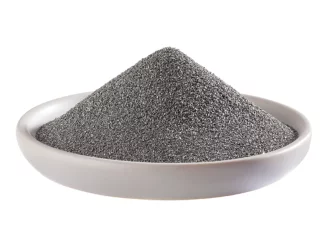Gas atomized 18Ni300 steel powder
Princeton Powder offers high-quality 18Ni300 maraging steel powder, precision-engineered for Selective Laser Melting (SLM), Direct Metal Laser Sintering (DMLS), and Powder Bed Fusion (PBF). Our gas-atomized 18Ni300 powder, with a customized particle size of 15-45um, 15-53 um, and 45-105um, delivers exceptional mechanical strength, hardness (up to 54 HRC after aging), and fracture toughness, making it the ideal choice for aerospace, tooling, automotive, and high-performance engineering applications.
Princeton Powder is a leading supplier of 18Ni300 metal powder. Gas atomized 18Ni300 powder are for sale in bulk.
18Ni300 Iron Based Metal Powder
Formula | 18Ni300 steel |
Synonyms | X3NiCoMoTi 18-9-5, 1.2709 steel, Maraging Steel 300 |
Appearance | Grey particle |
Particle Size | 15-53 um, 15-45 um, 45-105 um, or customize |
Melting Point | 1413℃ |
Apparent Density | >4.00 g/cm3 |
Tap Density | 4.80 g/cm3 |
Application | Additive manufacturing, Gas Atomization, 3d Printing, Laser Powder Bed Fusion |
Description of 18Ni300 steel Powder
Princeton Powder, a trusted wholesale supplier of iron-based metal powders, presents 18Ni300 maraging steel powder – also known as X3NiCoMoTi 18-9-5 and 1.2709 steel. This high-strength steel alloy is composed primarily of iron (Fe) with approximately 18% nickel (Ni), along with strategic additions of cobalt (Co), molybdenum (Mo), and titanium (Ti) that deliver exceptional mechanical properties for demanding industrial applications.
18Ni300 steel powder Chemical Composition
Chemical Composition (wt%) | ||||||||||
Item | Fe | C | Mn | Si | Ni | Cr | Mo | V | W | Al |
18Ni300 | Bal | ≤0.03 | – | ≤0.1 | 17.0~19.0 | ≤0.5 | 4.5~5.2 | – | – | ≤0.05~0.15 |
Mg | Cu | S | Nb | Co | P | Ti | Zr |
|
| |
– | ≤0.5 | – | – | 8.5~9.5 | – | 0.6~0.8 | – |
|
| |
Oxygen≤800 ppm; Nitrogen≤600 ppm
18Ni300 metal powder Particle Size:
<45μm, <53μm, 15-45μm, 15-53μm, 45-150μm. (A variety of particle size metal powder can be customized upon request)
Maraging steel 18Ni300 powder applications
- 3D Printing (Additive Manufacturing): 18Ni300 steel powder is widely used in 3D printing due to its excellent mechanical properties. It is used to produce complex, high-strength parts for aerospace, automotive, and tooling industries.
- Tooling and Die Manufacturing: Its high hardness and strength make it ideal for manufacturing durable tooling and die components.
- Aerospace Components: Due to its strength and lightweight properties, it is utilized in the aerospace industry for critical components.
- Engineering Applications: This steel is used in various engineering applications requiring high strength and precision.
- 18Ni300 powder for Metal Injection Molding (MIM)
- 18Ni300 powder for Powder Bed Fusion (PBF)
18Ni300 steel Powder Reference
Microstructure and mechanical properties of maraging 18Ni-300 steel obtained by powder bed based selective laser melting process
- Laser additive manufacturing (LAM) technology has been widely used for manufacturing, strengthening and repairing components in some areas.
- The as-fabricated maraging steel part was composed of amartensitic phase and a small fraction of austenite phase. After heat treatment, the volume fraction of austenite slightly increased because of the long-time heat treatment and the occurrence of the reversion of the martensitic phase into theaustenite phase. The relative density of the as-fabricated part was 98.2% 60.52%.
Maraging alloys are essentially carbon-free, a protective atmosphere is not required during annealing or aging. Material is supplied in the solution annealed condition with a hardness of 30/35 Rc. Typical heat treat time/temperature are listed below. Large cross sections should be aged for longer periods.
The material for additive manufacturing was 18Ni300 maraging steel. This steel is also known as X3NiCoMoTi 18-9-5, an equivalent to 1.2709 steel.
Maraging steel is essentially free of carbon, which distinguishes it from other types of steel. The carbon content is kept very low to avoid the formation of titanium carbide (TiC) precipitates, which severely reduce the impact strength, ductility and toughness when present in high concentration.

